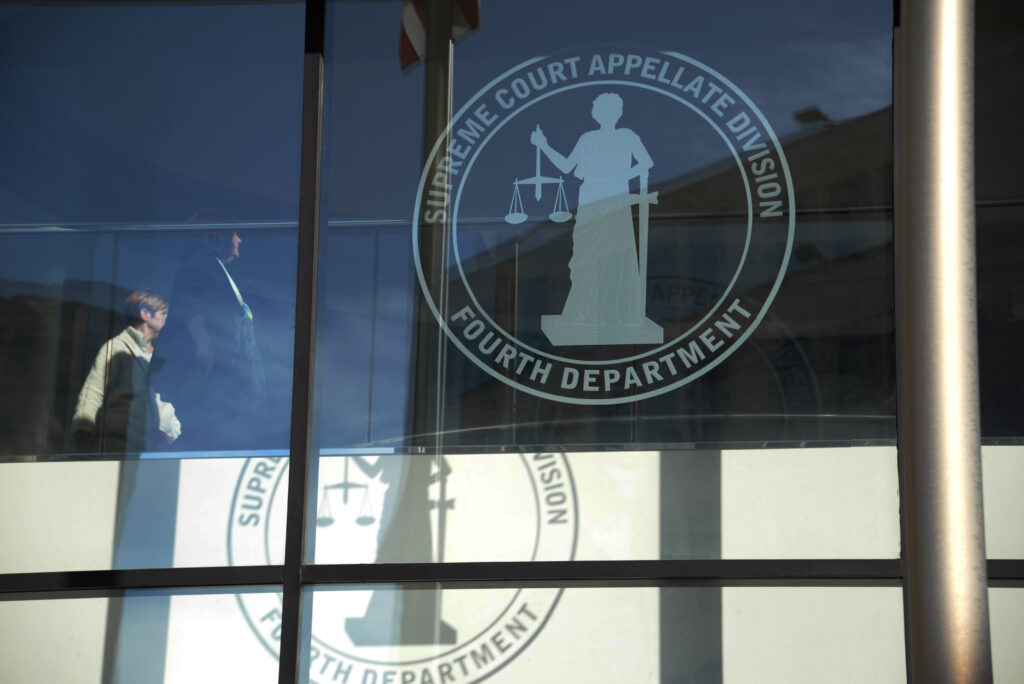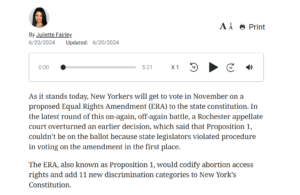Photo Credit: Emanphoto


But it’s not over yet. The lawyer who sued, civil rights attorney Bobbie Anne Flower Cox, has vowed to appeal. Ms. Cox called the June 18 ruling in Marjorie Byrnes v. Andrea Stewart-Cousins “wholly unprecedented.”
The court argued that Ms. Cox was too late in bringing her case.
“The sole cause of action here is subject to the four-month statute of limitations and is time-barred,” the Fourth Department Appellate Division judges wrote in the opinion. “The remaining contentions are academic in light of our determination.”
Ms. Cox told The Epoch Times that the court was wrong, that the statute of limitations that the court cites doesn’t apply here.
“Never before has a court held that a lawsuit against the State Legislature, pertaining to the Legislature’s power under the Constitution, is subject to a legal procedure with a four-month statute of limitations,” Ms. Cox told The Epoch Times.
The judges ruled in the state’s favor by determining that a statutory code for government agencies, known as New York State Civil Practice Law and Rules (CPLR) Article 78, applies to Ms. Cox’s claims.
The ERA was introduced and approved by both houses of the New York legislature in a single day—on July 1, 2022—after Gov. Kathy Hochul called a special session to protect abortion rights in the state in response to the U.S. Supreme Court striking down Roe v. Wade in its Dobbs decision on June 24, 2022. According to the state constitution, the legislature was required to wait 20 days before voting on the amendment, until New York Attorney General Letitia James had issued an opinion as to whether or not it conflicts with other parts of the constitution. Ms. James issued her opinion on July 6, 2022.
“The June 18 decision would overturn long-standing case law and procedural practice,” Ms. Cox said. “It is, quite frankly, illogical. We note that the court said nothing about the merits of the case because it is beyond question that the Legislature violated the constitutional process for the approval of amendments.”
Elected officials named in the lawsuit include Democrat state Senate Majority Leader Andrea Stewart-Cousins, Republican state Senate Minority Leader Robert Ortt, Democrat state Assembly Speaker Carl Heastie, Republican state Assembly Minority Leader William Barclay, and the New York State Board of Elections.
The decision sets a new precedent that will dramatically change statewide governance, according to attorney and former U.S. Rep. John Faso, a New York Republican.
“It would expose many actions of the state legislature to this kind of proceeding and courts have consistently held that the legislature is not subject to an Article 78 proceeding,” Mr. Faso told The Epoch Times.
Mr. Brockner also argued before the judicial panel that a written opinion from the attorney general’s office is only advisory, not mandatory.
At oral arguments this week, attorney Lisa Perillo represented the two Republican leaders in the state Senate and Assembly, Mr. Ortt and Mr. Barclay, while attorney Christiane Browne, who works with Ms. Cox, raised arguments on behalf of Ms. Byrnes and the other plaintiffs.
The plaintiffs alleged that the legislature did not wait 20 days to vote on the amendment at which time Ms. James was required by the state constitution to issue an opinion.
“The action was based upon the Constitution of the state of New York, not based upon a rule or procedure within the legislature so, we believe they violated the Constitution and that kind of violation is not subject to a statute of limitations rule,” Mr. Faso said.
Because the attorney general’s office won, the ERA will be put to voters in November unless Ms. Cox wins on appeal to the Court of Appeals, the state’s highest court.
“We are confident that the Court of Appeals will reverse this erroneous decision and reinstate the trial court’s just opinion,” Ms. Cox said.
Neither the attorney general’s office nor Mr. Brockner replied to requests for comment.



